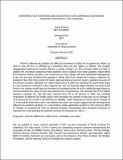Deferred Tax Positions and Incentives for Corporate Behavior around Corporate Tax Changes
Author(s)
Poterba, James M.; Rao, Nirupama; Seidman, Jeri
DownloadPoterba_Deferred tax.pdf (176.7Kb)
OPEN_ACCESS_POLICY
Open Access Policy
Creative Commons Attribution-Noncommercial-Share Alike
Terms of use
Metadata
Show full item recordAbstract
A firm's deferred tax position can affect its incentives to lobby for or against tax reform, as
well as how the firm is affected by a transition from one tax regime to another. We compile
disaggregated deferred tax position data for a sample of large U.S. firms between 1993 and 2004 to
analyze the incentives created by these positions and to explore how these positions might affect
firm behavior before and after a pre-announced tax rate change. We find substantial heterogeneity
in the size and sign of deferred tax positions. While half of our sample firms report a deferred tax
position of less than three percent of assets, approximately ten percent report a position in excess of
ten percent of assets. Although one might expect firms to defer the reporting of income when there
is a pre-announced reduction in the corporate tax rate, we find that approximately one third of the
firms in our sample would have an incentive to accelerate income in such a setting because doing so
would maximize the value of their net operating loss carryforwards. We estimate that if the federal
statutory corporate tax rate had been reduced from 35 to 30 percent in 2004, the resulting
revaluation of deferred tax assets would have increased net income in that year by an average of
16.5 percent for firms with a net deferred tax liability, while reducing net income by an average of
11.4 percent for those firms with a net deferred tax asset. Our results suggest that the heterogeneous
deferred tax positions of large U.S. corporations create substantial variation in the short-run effect
of changes in corporate tax rates on reported earnings. Recognizing these divergent incentives is
important for understanding the political economy of corporate tax reform.
Date issued
2010-02Department
Massachusetts Institute of Technology. Department of EconomicsJournal
National Tax Journal
Publisher
National Tax Association-Tax Institute of America
Citation
Poterba, James, Nirupama Rao, and Jeri Seidman. "Deferred Tax Positions and Incentives for Corporate Behavior around Corporate Tax Changes." National Tax Journal, 64, 27-57 (March 2011).
Version: Author's final manuscript
ISSN
0028-0283